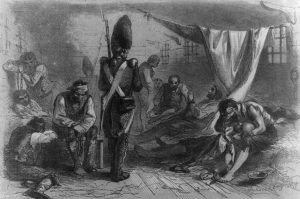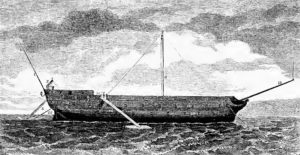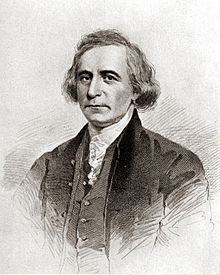
The Ghost Ship of Brooklyn – An Untold Story of the American Revolution
The Ghost Ship of Brooklyn – An Untold Story of the American Revolution
Copyright 2017 by Robert P. Watson
The Ghost Ship of Brooklyn is a fascinating narrative of a surprisingly obscure chapter in the history of the American Revolution. The author tells the story largely from the accounts of 5 separate prisoners of war who were held on the HMS Jersey, a British Warship that was gutted (“hulked” was the term used in the book). As many as 15 smaller British ships, were also hulked and along with the Jersey, served as floating prisons. Over the 7 years between 1776 and 1783, these ships served in this despicable capacity and were moored at Wallabout Bay on the East River in Brooklyn. The Jersey held at any one time from 800 to 1200 prisoners. The others held between 200 and 300 by comparison.
The treatment of these prisoners of war on these dungeon ships, was as brutal and abusive as any recorded in history. The astounding number of deaths on these repurposed prison ships, most dominantly the Jersey, exceeded the number of American deaths incurred in the entire Revolutionary War. The estimate of prisoner deaths from 1776 to 1783 are between 10,000 and 11,000. By comparison this is more than 2x the number of American military deaths incurred in all of the battles combined.
The fact that the Jersey and other British ships were used for the purpose of housing American prisoners of war, was due to the high numbers of prisoners taken in the battle for New York that resulted in 4000 captured American militia for which the Britons simply had no accommodation. Keeping them in sugar warehouses and King”s College in addition to the jail houses in New York City, was inadequate. They simply were not prepared for the number of prisoners.

The author provides excellent context for how this evolved from what was believed to be a temporary solution (the British thought the war would only last a year or so, particularly after taking New York), to the primary method of dealing with American prisoners and privateers until the war was over.
As time went on, more and more privateers were added to the prisoner rolls, which complicated attempts at prisoner exchanges, as the British did not recognize these prisoners as having any claim on decent treatment. Further, the inhumane and often sadistic abuse received by the Americans was justified as a means of psychological terror to deter Americans from continuing the fight for freedom. As it turned out, it eventually had the opposite effect.
Mr. Watson introduces us to the 5 men and boys who survived the most wretched of all prison ships and who wrote gripping narratives of their experiences, captures, escapes and releases: Thomas Dring, Thomas Andros, Ebenezer Fox, Christopher Hawkins and Andrew Sherbourne, who ranged in age from 13 to 25. They were captured either as privateers or militia prisoners and were sent to the Jersey where they endured months under the foulest of circumstances, in stifling heat to freezing cold without coats or extra clothing in most cases and with the barest of possessions, brackish water, and little food.

They all recounted how each day began by being told, Rebels bring up your dead!, and between 6 and 12 dead prisoners each morning, who had perished from disease, starvation, or asphyxiation, were brought up to the top deck to be disposed of either in mass graves or by attaching them to cannonballs and throwing them overboard. They told of how the prisoners were given putrid worm ridden partial rations and how they were shut up in to the bowels of the ship each night without ventilation or light. There was so little room below decks that prisoners could not stretch themselves out at the same time, often sleeping in their own excrement, or attacked by rats in the night.
There were also accounts of several of the ghost ships being set ablaze by the prisoners who thought it more merciful to die by fire than to live another day of torture. Four of the prison ships met this end along with their crew. They chronicled the escape attempts, the treatment by guards, (the Loyalists were deemed the most horrific), and the never-ending diseases that ripped through the ships. In one story, Thomas Dring describes attempting to inoculate himself and others using the smallpox sores of another prisoner. (In doing so, he was successful with himself, but another prisoner died as a result).
It was understood that if the prisoners would swear fealty to the Crown and agree to fight on behalf of the Britons, that they could be freed. For the most part, the prisoners refused to betray their new country.
 This phenomenal story chronicles the courage, endurance and faith of these occupants of Hell, and the brutality of their overseers, men like David Sproat, Joshua Loring and William Cunningham, who were odious and cruel. The impact of these events terrified patriots but in the end, resulted in helping to stiffen the resolve of Americans to defeat the British.
This phenomenal story chronicles the courage, endurance and faith of these occupants of Hell, and the brutality of their overseers, men like David Sproat, Joshua Loring and William Cunningham, who were odious and cruel. The impact of these events terrified patriots but in the end, resulted in helping to stiffen the resolve of Americans to defeat the British.
The author introduces each chapter with several verses from The British Prison-Ship, by Philip Freneau, known as the poet of the American Revolution. He was interred on the prison ship Scorpion for 6-7 weeks and his experiences paralleled those of the Jersey.
We who live in the 21st century can scarcely imagine the torments of those who suffered horribly and died to give us the freedoms we have and how the British treated their subjects. It would be beneficial to make this required reading in every high school in America. As the author points out, no mini-series or movie has ever been made telling this story. It is a story that needs to be told.
The various horrors of these hulks to tell “
These prison ships where Pain and Penance dwell.
Where Death in ten-fold vengeance holds his reign
And injured ghosts, yet unavenged, complain:
This be my task.
 The posts are coming!
The posts are coming!


0 comments
Kick things off by filling out the form below.
Leave a Comment